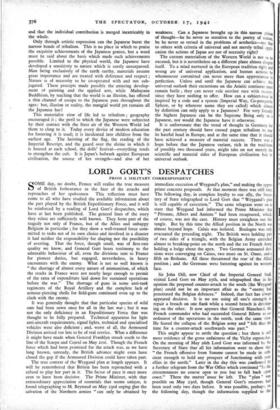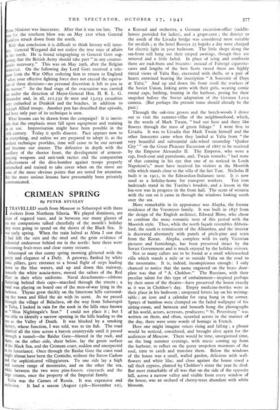LORD GORT'S DESPATCHES
FROM A MILITARY CORRESPONDENT SOME day, no doubt, France will realise the true measure of British forbearance in the face of the attacks and reproaches of her spokesmen This reflection must have come to all who have studied .the available information about the part played by the British Expeditionary Force, and it will be reinforced by a reading of Lord Gort's despatches, which have at last been published. The general lines of the story they relate are sufficiently well known. They form part of the tragedy not only of France, but of the Allies and unhappy Belgium in particular ; for they show a well-trained force com- mitted to tasks not of its own choice and involved in a disaster it had neither the responsibility for shaping nor the possibility of averting. That the force, though small, was of first-rate quality we know, and General Gort bears testimony to the admirable behaviour of all, even the divisions sent to France for pioneer duties, but engaged, nevertheless, in heavy encounters with the enemy. What is not so well known is " the shortage of almost every nature of ammunition, of which the stocks in France were not nearly large enough to permit of the rates of expenditure laid down for sustained operations before the war." The shortage of guns in some anti-tank regiments of the Royal Artillery and the complete lack of armour-piercing shells for field-guns continued even up to the clash with the enemy.
It was generally thought that that particular species of wild oats had been sown once for all in the last war ; but it was not the only deficiency in an Expeditionary Force that was thought to be fully prepared. Technical apparatus for light anti-aircraft requirements, signal lights, technical and specialised vehicles were also deficient ; and, worst of all, the Armoured Division arrived too late to be of real service. What a difference it might have made when General Franklyn struck south to the line of the Scarpe and Cojeul on May 21st. Though the French force which had been promised for the attack was, as we have long known, unready, the British advance might even have closed the gap if the Armoured Division could have taken part.
The true context of the Weygand plan at length appears. It will be remembered that Britain has been reproached with a refusal to play her part in it. The factor of pace is once more seen to have been decisive. The Prime Minister, with that extraordinary appreciation of essentials that seems unique, is found telegraphing to M. Reynaud on May 23rd urging that the salvation of the Northern armies " can only be obtained by immediate execution of Weygand's plan," and making the appro- priate concrete proposals. At that moment there was still time. The following day, in complete loyalty to our ally, the Secre- tary of State telegraphed to Lord Gort that " Weygand's plan is still capable of execution." The same telegram went on to state that Weygand had informed the Prime Minister that " Peronne, Albert and Amiens " had been recaptured, which, of course, was not the case. History must straighten out this tangle. But by this time the Allied position in the North was almost beyond hope. Calais was isolated. Boulogne was only evacuated the preceding night. The British were holding part of two sides of a triangle, with the Belgian Army stretched almost to breaking-point on the north and the 1st French Amy holding a bulge about the apex. Two German armoured divi- sions were converging on Calais, two more on St. Omer, and a fifth on-Bethune. All these threatened the rear' of the Allied position ; and the Germans were battering against its western face.
Sir John Dill, now Chief of the Imperial General Staff, visited Lord Gort on May 25th, and telegraphed that in his opinion the proposed counter-attack to the south (the Weygand plan) could not be an important affair as the " enemy had penetrated the Belgian defences." Indeed, that fact has always appeared decisive. It is no use using all one's strength to repair a breach on one flank while a second breach is develop'. ing on the other. It now appears that General Blanchard, the French commander who had succeeded General Bilotte as co- ordinator of the operations in the north, took the same view. He feared the collapse of the Belgian army and " felt that the time for a counter-attack southwards was past." This might appear to settle the question ; but there is still more evidence of the gross unfairness of the Vichy reproaches• On the morning of May 26th Lord Gort was informed by the Secretary of State that all his information went to show that " the French offensive from Somme cannot be made in suffi- cient strength to hold any prospect of functioning with your allies in the north." Later in the day this was confirmed by a further telegram from the War Office which continued "In the circumstances no course ()E'en to you but to fall back upon coast." There the matter must be left. The " plan " was possible on May 23rd, though General Gort's reserves had been used only two days before. It was possible, perhaps‘ on the following day, though the information supplied to the prime Minister was inaccurate. After that it was too late. The tine for the southern blow was on May list when General Franklyn struck down from the north.
With that conclusion it is difficult to think history will inter- ere. General Weygand did not realise the true state of affairs In the north. He is found telegraphing to General Gort sug- gesting that the British Army should take part " in any counter- attacks necessary." This was on May 29th, after the Belgian ,Armistice. On the following day Lord Gort received a tele- gram from the War Office ordering him to return to England "when your effective fighting force does not exceed the equiva- lent of three divisions—no personal discretion is left to you in she matter." So the final stage of the evacuation was carried out under the direction of Major-General Hon. H. R. L. G. Alexander and, in all, 211,532 fit -men and 13,053 casualties were embarked at Dunkirk and the beaches, in addition to t12,546 Allied troops. Another pen has described that episode, and here only part of its technique is seen.
What lessons can be drawn from the campaign? It is inevit- able that the emphasis must fall upon equipment and training in its use. Improvisation might have been possible in the 18th century. Today it spells disaster. Pace appears now to be everything, and unless we are prepared to adopt it, as the modern technique provides, time will cease to be our servant and become our master. The defensive in depth with the corollary of the shorter front, the development of armour- piercing weapons and and-tank tactics and the comparative Ineffectiveness of the dive-bomber against troops properly entrenched and trained to take cover when on the move are some of the more obvious points that are noted for attention. But the more serious lessons have presumably been privately communicated.



























 Previous page
Previous page